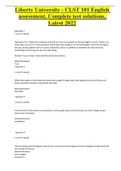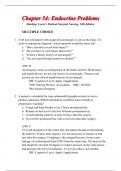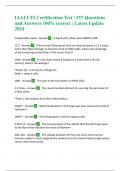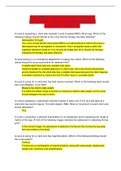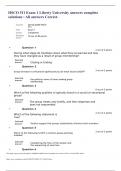Historians have disagreed to what extent Adolf Hitler was responsible for the Holocaust.
What is your view to what extent was Hitler responsible for the Holocaust?
The Holocaust remains the largest genocide in world history, with the Holocaust resulting in
an estimated 3 to 7 million deaths across Europe during the 20th century. However, despite
endless discussion amongst Historians into the events leading up to and during the Holocaust,
there still remains a wide disagreement where Hitler’s responsibility lies with contrasting
views through the functionalist, intentionalist and structuralist perspectives.
Historians of the intentionalist view envisage Hitler’s path to the massacre of the Jewry as a
‘straight road’, maintaining the view that the ‘Final Solution’, was part of Hitler’s long-term
masterplan, portraying Hitler as a sole instigator. Functionalist Historians approach the matter
differently, affirming the view that the Holocaust cannot be solely attributed to Hitler alone,
but through a combination of factors, placing responsibility on key members of the Nazi
bureaucracy such as Himmler and Eichmann along with the role of the ordinary Germans.
This essay will review key historiography regarding this debate and come to a conclusion on
the extent of Hitler’s responsibility for the Holocaust.
Lucy Dawidowicz aligns herself with the intentialist approach, believing that without Hitler
the Holocaust would simply not have occurred. Dawidowicz basis her argument on numerous
anti-Semitic statements made by Hitler thorough sources such as ‘Mein Kampf’. Hans
Mommsen, follows the functionalist approach, believing that the Holocaust cannot be solely
placed on Hitler but only to a degree, highlighting the role key members of the Nazi Elite
played in reaching the practicalities of the Holocaust. Finally, Daniel Goldhagen contrasts
these views removing the responsibility from Hitler, believing that ordinary Germans allowed
the Holocaust to happen and even supported it, pinning responsibility on them.
Lucy Dawidowicz, ‘The War Against the Jews, 1933-1945
Dawidowicz presents her argument of the intentionalist view, that the final solution was
always planned as part of Adolf Hitler’s deep-rooted anti-Semitism and hatred for the Jews.
The central argument Dawidowicz relates to is that the ‘Final Solution’, was not an incidental
happening but was the centrepiece of Hitler’s ideology, with Hitler’s plan all along to
exterminate the Jewish race to form an Aryan Germany. Dawidowicz’s argument is
supported through evidential means predominantly through certain passages in Hitler’s
biography ‘Mein Kampf’ or through speeches to the Reichstag. Dawidowicz refers to what is
now known as Hitler’s prophecy, which refers to the "the annihilation of the Jewish race in
Europe1", in the event of any war: “If international finance Jewry inside and outside Europe
should succeed in plunging the nations once more into a world war, the result will be not
the Bolshevisation of the earth and thereby the victory of Jewry, but the annihilation of the
Jewish race in Europe1”. This suggests that Hitler had always thought of a violent solution to
his proposed ‘Jewish Question’. These words were much similar to comments Hitler has
made to foreign politicians in private meetings after the Kristallnacht programme of 1938,
furthermore, supporting Dawidowicz’s view that Hitler’s genocidal intentions were already
predetermined. Dawidowicz argues that evidence of Hitler’s anti-Semitic hatred, which give
evidence to his early genocidal intentions, can be rooted back to his upbringing in Vienna.
This can initially be seen through the influence of two Austrian politicians von Schonerer
and most notably the then Vienna mayor Karl Lueger, who Hitler even referenced in ‘Mein
1
Lucy S Dawidowicz, The War against the Jews, 1933-1945 Open Road Media, Page 44
, Holocaust Coursework
Kampf’, as “the greatest German mayor of all time2” highlighted the lasting influence Lueger
had on Hitler’s thinking. Lueger was known for his association with Von Schonerer where
they were known for antisemitic politics and championing of German nationalism within
Vienna. Lueger advocated racist policies against non-German speaking minorities in Austria-
Hungary in 1887 as well as supporting a bill proposed by Von Schonerer, restricting the
immigration of Romanian and Russian Jews. This contextually highlights that an anti-
Sematic political climate was present in Vienna at the time and provides evidence to
Dawidowicz argument that Hitler’s xenophobic views were present from a young age, which
would escalate and eventually turn into genocidal intentions. Moreover, Dawidowicz
highlights the loss of World War One for Germany as a turning point for anti-Semites
especially in Nationalist groups, with Jews scapegoated for the loss of the war. Dawidowicz
saw this as a catalyst in accelerating Hitlers genocidal intentions, basing this on evidence
with Hitler’s first response to the ‘Jewish Question’ in 1919, defining the Jews as a race
rather than a religious community as well as characterizing the effect of a Jewish presence as
a “race-tuberculosis of the peoples3”. Furthermore, researching deeper into this Hitler’s first
written comments certainly provide precedence to further actions, identifying in 1919 that the
initial goal of the German government to be discriminatory legislation against Jews, with the
“ultimate goal must definitely be the removal of the Jews altogether4”. All in all, external
sources have the backing of Dawidowicz that Hitler had an intensified racial hatred towards
the Jews after the war, shedding light onto Dawidowicz’s argument that it was Hitler’s
predetermined and ideological goal to annihilate the Jewish population in Europe.
Consequently, this provides evidence to Dawidowicz argument that Hitler was fixated on the
happening of the Holocaust from his early years with anti-sematic beliefs virulent in Vienna
and only catalysed overtime with events such as the defeat in WW1 accelerating the eventual
happening, whilst decrees such as the ‘enabling act5’, providing Hitler the platform and ‘the
legal authority of a dictatorship5’, which Dawidowicz argued allowed the inevitable to
happen. Despite, the evidential basis Dawidowicz has based her argument on, it is often
debated between Historians, that Hitler’s initial view on ‘the removal of the Jews4’, is open to
interpretation. This is raised by an Israeli Holocaust expert, Yehuda Bauer who views
Hitler’s initial plan as the emigration of the Jews, rather than a planned genocide. He raised
the view that Heinrich Himmler on the behalf himself and Hitler stated their rejection of “the
Bolshevik method of physical annihilation of a people out of inner conviction as un-German
and impossible6," and goes on to recommend the Madagascar plan as the desired "territorial
solution7" of the "Jewish Question" proving that there was no master plan for genocide going
back to the days when Hitler wrote ‘Mein Kampf’. This clouds Dawidowicz’s view with
uncertainty as despite, their being evidence that Hitler’s anti-Sematic beliefs were prevalent
through his younger years and before he came into power, it seems too broad of a view that
Hitler’s anti-Sematic views were able to translate into Jewish genocide this early, regardless
of Dawidowicz valuable argument.
Dawidowicz’s descendancy was of a Jewish suffrage which would have influenced her
beliefs, with those around her attributing much of the blame to Hitler as a solely responsible
for the genocide process. During the War, she remained in her home country of the United
2
Adolf Hitler, Mein Kampf, Translated to English by James Murphy, Page 107
3
https://www.ushmm.org/learn/timeline-of-events/before-1933/adolf-hitler-issues-comment-on-the-jewish-
question
4
Adolf Hitler, First Major Statement on Anti-Semitism: Reply to Adolf Gemlich, September 16 th, 1919
5
Lucy S Dawidowicz, The War against the Jews, 1933-1945 Open Road Media, Page 102
6
Yehuda Bauer, JSTOR, Genocide: Was it the Nazis’ Original Plan, Page 33-45
7
Ibid, Page 37

